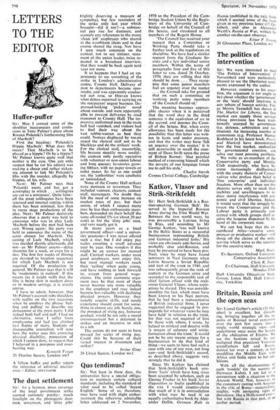Quo tendimus?
Sir: Not least in these days, the universities have a special obliga- tion to maintain certain cultural standards, including the standard of what used to be called 'decent English.' Some of us, therefore, may have read with slight embar- rassment the otherwise admirable letter addressed on 2 November,
1970 to the President of the Cam-, bridge Student Union by the Regis- trary of the University of Cam- bridge on behalf of the Council of the Senate. and circulated to all members of the Regent House.
'The Council has received your
request that a Committee or Working Party should take a further look at the regulations on discipline. We have had a similar request from the Graduate So- ciety and a few individual senior members. Within the terms of paragraphs four and five of this letter to you, dated 26 October, 1970, they are willing that this should be done . . . They recog- nise that some junior members feel an urgency over the matter . . . the Council take for granted that on such a committee or working party some members of the Council should sit.'
The meaning becomes appreci-
ably clearer when it is perceived that the word they in the third sentence is the equivalent of we in .the second. and denotes the Coun- cil of the Senate. But, when every allowance has been Made for the possibility that this letter was writ- ten in haste and under pressure, and that the writer may have 'felt an urgency over the matter,' it is still permissible to recall the com- ment of Dean Swift upon the prose of Bishop Burnet: 'that peculiar method of expressing himself which the poverty of our language forces me to call his style.'
Charles Smyth Corpus Christi College, Cambridge








































 Previous page
Previous page